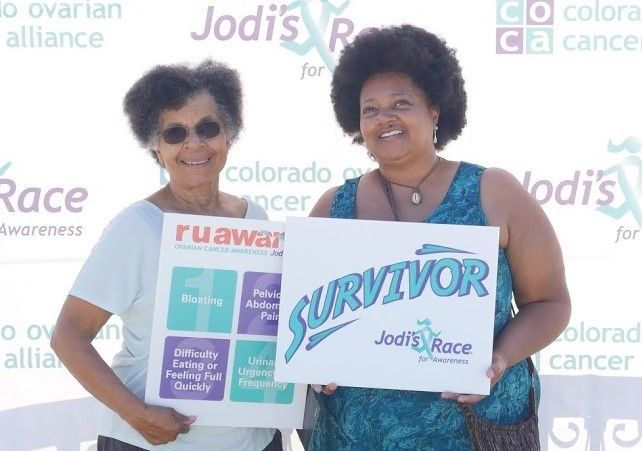Lesbian, Bisexual Women and Ovarian Cancer
Did you know that Lesbian and Bisexual women are at greater risk for developing ovarian cancer than the general population of women?
Here’s why:
- Lesbian women likely do not take contraception (i.e., birth control pills) and may be less likely to bear children. Use of birth control and having children lower the risk of developing ovarian cancer.
- Obesity is another leading risk factor for ovarian cancer. Maintaining a healthy body weight is important for all women.
- Lack of health insurance and additional barriers can influence lesbians to ignore routine health check-ups because there is less need for contraception and, according to studies, lesbians visit their gynecologist less frequently.
Sources:
- https://www.cancer.org/healthy/find-cancer-early/womens-health/cancer-facts-for-lesbians-and-bisexual-women.html
- https://www.sharecancersupport.org/2011/07/ovarian-cancer-in-the-lgbt-community/
- https://www.guttmacher.org/journals/psrh/2001/07/lesbians-are-more-likely-us-women-overall-have-risk-factors-gynecologic-and

Know the Symptoms of Ovarian Cancer
Historically ovarian cancer was called the “silent killer” because symptoms are vague and the disease is often not discovered until the late stages. However, studies have shown that the following symptoms are much more likely to occur in women with ovarian cancer than women in the general population. So, paying attention to recurring symptoms could help catch ovarian cancer it an earlier stage and increase the chance of survival.
The most common symptoms ovarian cancer include:
- Bloating
- Pelvic or abdominal pain
- Difficulty eating or feeling full quickly
- Urinary symptoms (urgency or frequency)
You can learn more about the symptoms of ovarian cancer in another section of this website: SYMPTOMS
It can be beneficial to KEEP TRACK of your symptoms to gather information about how severe and frequent your symptoms are. Then you can share that information with your doctor. Below is a link to a Symptom Tracking Diary.
What if you DO have symptoms?
If you experience even one of the symptoms listed above for more than 17 days in any given month, please reach out to your doctor (preferably a gynecologist) and ask for:
- Pelvic / rectal exam
- Transvaginal ultrasound
- CA-125 blood test
And take your symptom tracking diary with you!
How to better control the risk of developing ovarian cancer - for EVERY woman!
- Familiarize yourself with the symptoms of ovarian cancer
- Track any symptoms that you are experiencing
- Know your family history of ovarian, breast and colon cancer
- Maintain a healthy weight
- Never miss an annual gynecologic exam
- Consider using birth control pills. There are pros (possible protection from OC) and cons (increased risk of blood clots or breast cancer) of taking birth control pills. Please discuss the risks and benefits with your doctor. You can learn more about cancer risk and birth control pills here: https://ww5.komen.org/BreastCancer/CurrentorRecentUseofBirthControlPills.html
Risk Factors associated with ovarian cancer
As mentioned above, lesbians and bisexual women are at greater risk for developing ovarian cancer than the general population of women because lesbian women likely do not take contraception, may be overweight, and may ignore routine health check ups.
While most women with ovarian cancer do not have any known risk factors, some do exist. If a woman has one or more risk factors, she will not necessarily develop ovarian cancer; however, her risk may be higher than the average woman’s.
We want you to know about other risk factors as well:
- Genetics - About 20 to 25 percent of women diagnosed with ovarian cancer have a hereditary tendency to develop the disease. The most significant risk factor for ovarian cancer is an inherited genetic mutation in one of two genes: breast cancer gene 1 (BRCA1) or breast cancer gene 2 (BRCA2). These genetic mutations are responsible for about 10 to 15 percent of all ovarian cancers.
Eastern European women and women of Ashkenazi Jewish descent are at a higher risk of carrying BRCA1 and BRCA2 mutations. In addition, women of Hispanic heritage, including those from Colorado's San Luis Valley, are at higher risk for carrying the mutation.
Since these genes are linked to both breast and ovarian cancer, women who have had breast cancer have an increased risk of ovarian cancer. You can find more detail about BRCA1 and BRCA2 mutations in the Ovarian Cancer Risk Consensus Statement
- Increasing Age - All women are at risk of developing ovarian cancer regardless of age; however, a woman’s risk is highest during her 60s and increases with age through her late 70s. About 69 percent of women diagnosed with ovarian cancer in the United States from 2002 to 2006 were 55 or older. The median age (at which half of all reported cases are older and half are younger) at diagnosis is 63.
- Reproductive History and Infertility - Research suggests a relationship between the number of menstrual cycles in a woman’s lifetime and her risk of developing ovarian cancer. A woman is at an increased risk if she: started menstruating at an early age (before 12), has not given birth to any children, had her first child after 30, experienced menopause after 50, has never taken oral contraceptives, infertility, regardless of whether or not a woman uses fertility drugs, also increases the risk of ovarian cancer.
- Hormone Replacement Therapy - Doctors may prescribe hormone replacement therapy to alleviate symptoms associated with menopause (hot flashes, night sweats, sleeplessness, vaginal dryness) that occur as the body adjusts to decreased levels of estrogen. Hormone replacement therapy usually involves treatment with either estrogen alone (for women who have had a hysterectomy) or a combination of estrogen with progesterone or progestin (for women who have not had a hysterectomy). Women who use menopausal hormone therapy are at an increased risk for ovarian cancer. Recent studies indicate that using a combination of estrogen and progestin for five or more years significantly increases the risk of ovarian cancer in women who have not had a hysterectomy. Ten or more years of estrogen use increases the risk of ovarian cancer in women who have had a hysterectomy.
Barriers to medical care for lesbians and bisexual women
Studies have found that lesbians and bisexual women get less routine health care than other women, including colon, breast, and cervical cancer screening tests.
Some of the reasons for this include:
- Low rates of health insurance: Many health insurance policies don’t cover unmarried partners. This may make it more difficult for many lesbians and bisexual women to get quality health care.
- Fear of discrimination: Many women don’t tell their health care providers about their sexual orientation, because they don’t want discrimination to affect the quality of health care they receive. This can make it harder to have a comfortable relationship with a provider.
- Negative experiences with health care providers: Fear of having a negative experience with a health care provider can lead some women to delay or avoid medical care, especially routine care such as early detection tests or reporting recurring symptoms to their doctor. Missing routine appointments and cancer screening tests can lead to cancer being diagnosed at a later stage, when it’s often harder to treat.
There are many lesbian, gay, bisexual, and transgender/transsexual (LGBT)-friendly providers. An LGBT community center or group may be able to refer you to one of these providers. Don’t give up – find the respectful care you deserve!
Other information and resources:
For more information on ovarian cancer, the Colorado Ovarian Cancer Alliance provides a resource guide for both local and online resources. You can access and online copy here: RESOURCE GUIDE
In addition, the following websites provide good information with regard to ovarian cancer and the lesbian and bisexual community:
- https://cancer-network.org/
- https://www.sharecancersupport.org/2011/07/ovarian-cancer-in-the-lgbt-community/
- https://cancer-network.org/wp-content/uploads/2017/02/Lesbians_and_Ovarian_Cancer.pdf
- https://www.advocate.com/politics/commentary/2011/10/12/op-ed-how-prove-lesbians-are-more-risk-cancer
The Colorado Ovarian Cancer Alliance is dedicated to helping ALL women become more aware of the risk factors and symptoms of ovarian cancer and to providing programs that serve women who have the disease.
Please reach out to us for help and information.
We care about you!




